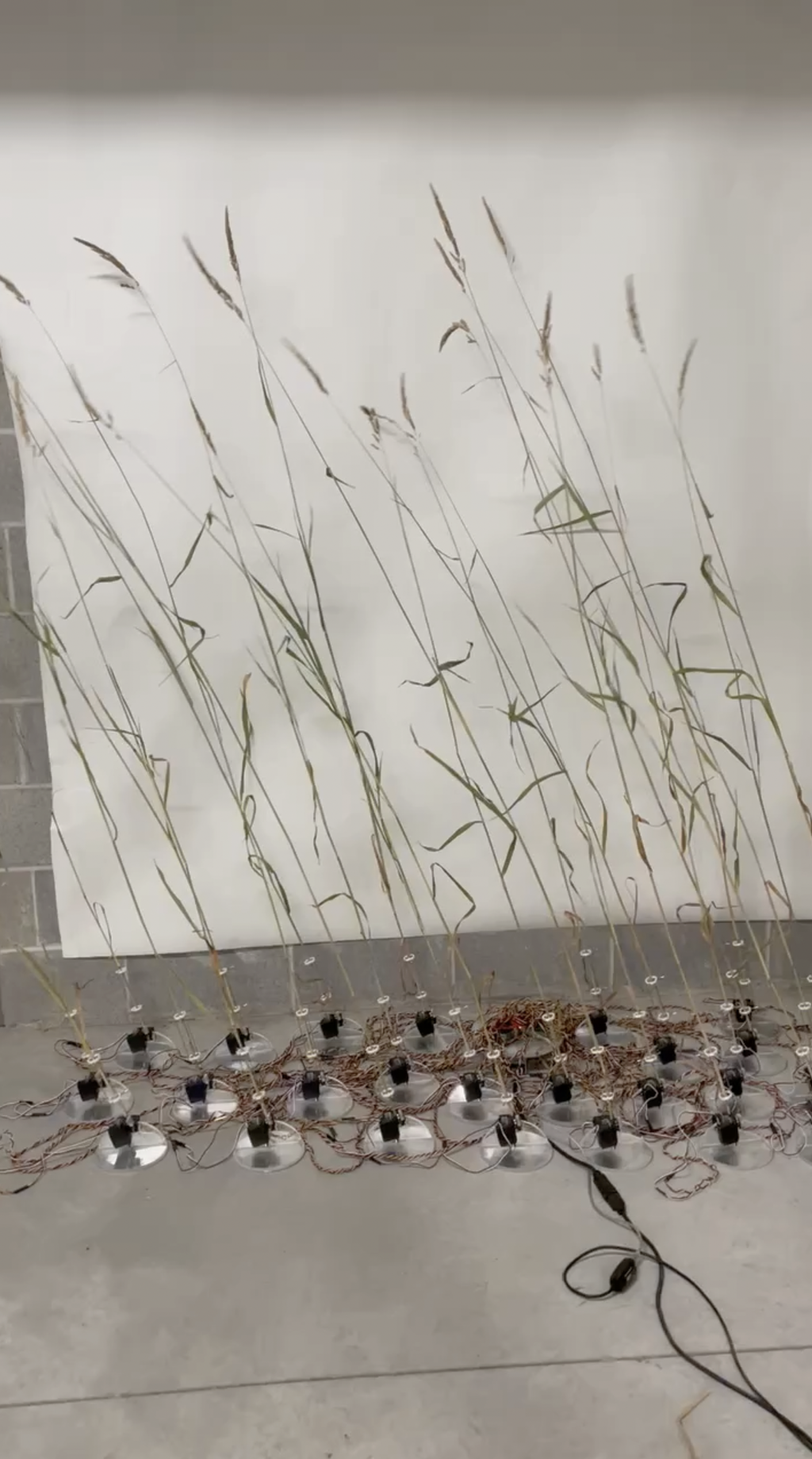The universe is vast and filled with countless worlds, but a new exhibit at the Brand Library & Art Center in Glendale, California, aims to shrink time and space. For “Blended Worlds: Experiments in Interplanetary Imagination,” artists collaborated with scientists and engineers from NASA’s Jet Propulsion Laboratory to create cross-disciplinary works that help illuminate the universe by bringing art and science together.
On view from Sept. 21, 2024, to Jan. 4, 2025, the exhibition is part of “PST ART: Art & Science Collide,” an event presented by the Getty and involving more than 70 exhibitions from museums and institutions across Southern California exploring the intersection of art and science.
The 126 grass stalks of “tele-present wind” are attached to mechanical tilting devices that move in response to Martian wind data.
Credit: NASA/JPL-Caltech” class=”MixinFancybox group cursor-pointer block”>

The 126 grass stalks of “tele-present wind” are attached to mechanical tilting devices that move in response to Martian wind data.
Credit: NASA/JPL-Caltech
“The magic of art is that it enhances our experiences and interactions with the world — and in this case, our universe,” said Dr. Laurie Leshin, director of JPL in Southern California. “We’re honored to work with great artists to bring the wonders of space to our community through this exhibition, which invites us all to be part of a grand journey of exploration and discovery.”
David Bowen’s installation “tele-present wind” features grass stalks attached to tilting mechanical devices that move in response to Martian wind data previously collected by NASA’s Perseverance rover mission. Helping make the effort possible were Rishi Verma, a data systems architect at JPL, and José Antonio Rodríguez-Manfredi, the principal investigator of the Mars Environmental Dynamics Analyzer (MEDA) system on Perseverance.
For “Seismic Percussion,” artist Moon Ribas creates an interplanetary drum score by translating seismic data from Earth, the Moon, and Mars. For Mars data, JPL’s Verma worked with Nobuaki Fuji of the Institut de Physique du Globe de Paris, who collaborated on NASA’s now-retired InSight lander. Ceri Nunn, a JPL planetary scientist, assisted with moonquake data.
Also featured is a handwritten version of U.S. Poet Laureate Ada Limón’s “In Praise of Mystery: A Poem for Europa,” the poem she dedicated to NASA’s Europa Clipper mission, which is targeting an October launch and will make multiple flybys of Jupiter’s icy moon Europa. The poem has been etched onto a metal plate on the spacecraft and will ride with the orbiter on its long journey.
Additional works allow visitors to experience Earth’s wonders through scents, use sound to convey the vast distances between our planet and those beyond our solar system, and blend heartbeats and other Earthly sounds with sonified data from Europa’s magnetic field.
“We were looking to create imaginative opportunities for people to connect with each other as they connect with the awe-inspiring science being conducted today,” said David Delgado, a cultural strategist and the project lead at JPL. “I know this experience has really opened the eyes of everyone collaborating on the project, and we hope it does the same for people who come to see ‘Blended Worlds.’”
As part of PST ART, a number of public programs and community events will also accompany the “Blended Worlds” gallery exhibition, including “Blended Worlds: An Evening of Art, Theater, and Science” hosted by Reggie Watts at the Alex Theatre in Glendale on Oct. 5, and “Earth Data: The Musical,” an original musical developed by Theater Arts at Caltech exploring the challenges of climate research and science as a human pursuit at Caltech’s Ramo Auditorium Nov. 1 to 3.
Artists’ collaborations with JPL and the display of their works at Glendale’s Brand Library were made possible by the generous support of the Glendale Arts and Culture Commission and the Glendale Library, Arts & Culture Trust.
More About JPL
A division of Caltech in Pasadena, California, JPL began in 1936 and ultimately built and helped launch America’s first satellite, Explorer 1, in 1958. By the end of that year, Congress established NASA and JPL became a part of the agency. Since then, JPL has managed such historic missions as Voyager, Galileo, Cassini, the Mars Exploration Rover program, the Perseverance Mars rover, and many more.
More About Glendale Library, Arts & Culture
Founded in 1907, the Glendale Library, Arts & Culture Department includes eight neighborhood libraries including the Brand Library & Art Center, a regional visual arts and music library and performance venue housed in the historic 1904 mansion of Glendale pioneer Leslie C. Brand, and the Central Library, a 93,000-square-foot center for individuals and groups to convene, collaborate, and create. The department also serves as the chief liaison to the Glendale Arts and Culture Commission which works to continually transform Glendale into an ever-evolving arts destination. Glendale Library Arts & Culture is supported in part through the efforts of the Glendale Library Arts & Culture Trust (GLACT). For more information visit GlendaleLAC.org, or contact Library, Arts & Culture at 818-548-2021 or via email at [email protected]. Follow on Instagram, Facebook, and X at @MyGlendaleLAC.
For more information about PST ART: Art & Science Collide, visit: pst.art
